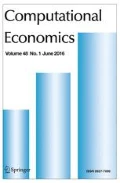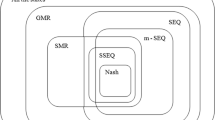Abstract
In non-cooperative models of coalition formation, players have to decide whether or not to participate in a coalition (alliance). Game theoretic analyses of the formation of alliances in games with externalities, stress the difficulties in designing self-enforcing treaties because of free-riding. The presence of a strong free-rider incentive prevents most alliances of being stable and/or effective. This paper focuses on computing stability in a game on multiple coalition formation with membership rules and different transfer schemes. A new mathematical programming notation for game theory concepts is outlined. To compute stability, the new notation is used for implementation into computer coding. Implementation and computation aspects are discussed. Numerical illustration of the algorithm shows that stability varies with the applied membership rules and transfer schemes. An application of coalition formation to International Environmental Agreements (lEAs) is provided.
Similar content being viewed by others
References
Altamirano-Cabrera, J.-C. and Finus, M. (2004). Permit Trading and Stability of International Climate Agreements.forthcoming to Journal of Applied Economics.
Bloch, F. (1995). Endogenous Structures of Association in Oligopolies. Rand J. Econ., 26, 537–556.
Bloch, F. (1996). Sequential Formation of Coalitions with Fixed Payoff Division and Externalities. Games Econ. Behav., 14, 90–123.
Bosello, F., Buchner, B., Carraro, C. and Raggi, D. (2004). Can Equity Enhance Efficiency? Some Lessons from ClimateNegotitations. C. Carraro and V. Fragnelli (eds.), Game Practice and the Environment, Edward Elgar, Cheltenham, UK.
Bosello, F., Carraro, C. and Buchner, B. (2003). Equity, Development, and Climate Change Control. Journal of theEuropean Economic Association, 1(2–3):601–611(11).
Botteon, M. and Carraro, C. (1997). Burden-Sharing and Coalition Stability in Environmental Negotiations with Asymmetric Countries Carraro, C. (ed), International Environmental Negotiations: Strategic Policy Issues, E. Elgar: Cheltenham,ch. 3, 26–55.
Carraro, C.(2003). The Structure of International Agreements on Climate Change. International Environmental Agreements onClimate Change, Kluwer Academic Publishers, Dordrecht, 1999. Carraro, C. and Marchiori, C. Stable Coalitions.Carraro, C. (ed), The Endogenous Formation of Economic Coalitions, E. Elgar: Cheltenham.
D'Aspremont, C.A., Jacquemin, A., Gabszewicz, J.J. and Weymark, J. (1983). On the Stability of Collusive Price Leadership.Canadian Journal of Economics, 16, 17–25.
Dellink, R.B., Altamirano, J.-C., Finus, M., van Ierland, E.C., Ruijs, A. and Weikard, H.P. (2003). Empirical BackgroundPaper of the STACO Model,mimeo, Wageningen University.
Eyckmans and J. Finus, M. (2003)(a) Coalition Formation in a Global Warming Game: How the Design of Protocols Affects theSuccess of Environmental Treaty-Making. vol. CLIMNEG WP, 56.
Eyckmans, J. and Finus, M. (2003)(b). New Roads to International Environmental Agreements: The Case of Global Warming. FEEMWorking Paper No. 88.2003.
Finus, M., van Ierland, E.C. and Dellink, R.B. (2006). Stability of Climate Coalitions in a Cartel Formation Game. Notadi Lavoro 61.2003, FEEM; forthcoming in Economics of Governance.
Finus, M., Altamirano, J.-C. and van Ierland, E.C. (2005). The effect of membership rules and voting schemes on the success ofinternational climate agreements. Public Choice, 125, 97–127.
Finus, M., S´iz, M.E. and Hendrix, E.M.T. (2004). An Empirical Test of New Develpments in Coalition Theory for theDesign of International Environmental Agreements. Submitted to Environmental& Resource Economics.
Morasch, K. (2000). Strategic alliances as Stackelberg cartels — concept and equilibrium alliance structure.International Journal of Industrial Organization, 18(2):257–282.
Nordhaus, W.D. (1994). Managing the Global Commons. Ed. MIT Press, Cambridge, MA.
Olieman, N.J. and Hendrix, E.M.T. (2006). Stability likelihood of coalitions in a two-stage cartel game: An estimationmethod. Forthcoming in European Journal of Operational Research.
Ray, D. and Vohra, R. (1997). Equilibrium Binding Agreements. Journal of Economic Theory, 73, 30–78.
Ray, D. and Vohra, R.A. (1999). Theory of Endogenous Coalition Structures. Games and Economic Behavior,26, 286–336.
S´iz, M.E., Olieman, N.J., and Hendrix, E.M.T., and Finus, M. (2004). Determination of Stable Structures in aMultiple Coalition Game. Mansholt Working Papers, Discussion Paper n.12.
Thoron, S. (2000). Market organization: Noncooperative models of coalition formation. Interaction and Market Structure, D.Delli Gatti, M. Gallegati and A. Kirman Editors, Springer-Verlag, 207–223.
Yi, S.-S. and H. Shin (1995). Endogenous Formation of Coalitions in Oligopoly Dartmouth College Department of Economics WPNo. 95–2.
Yi, S.-S. (1996). Endogenous Formation of Customs Unions under Imperfect Competition: Open Regionalism Is Good. J.Internat. Econ., 41, 151–175.
Yi, S.-S. (1997). Stable Coalition Structures with Externalities. Games and Economic Behavior, 20, 201–237.
Author information
Authors and Affiliations
Corresponding author
Additional information
Elena Sáiz was supported by the Wageningen Institute for Environment Climate Research (WIMEK)
Rights and permissions
About this article
Cite this article
Sáiz, M.E., Hendrix, E.M.T. & Olieman, N.J. On the Computation of Stability in Multiple Coalition Formation Games. Comput Econ 28, 251–275 (2006). https://doi.org/10.1007/s10614-006-9047-1
Received:
Accepted:
Published:
Issue Date:
DOI: https://doi.org/10.1007/s10614-006-9047-1




